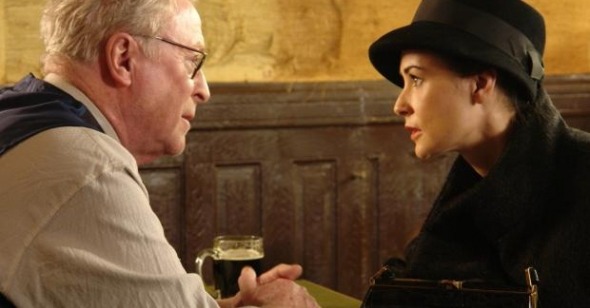Click Bait
By Matt Connolly
Flawless
Dir. Michael Radford, United Kingdom, Magnolia Pictures
If Demi Moore in constant motion is your idea of cinematic bliss, by all means: go see Flawless. This dramatically inert, ideologically muddled film possesses little worthy of praise, but it undeniably offers plenty of Moore striding purposefully through echoing marble hallways. If nothing else, it possesses an ardor for click-clacking high heels in mid-tread that will likely remain unchallenged until Wong Kar-wai’s latest comes stateside.
Set in the early 1960s, the film follows Laura Quinn (Moore), an executive at the London Diamond Company chipping away at the company’s glass ceiling through sober professionalism. Her position becomes jeopardized after receiving the blame for a business error, although it’s clear the dismissal relates more to gender than competence. Company janitor Hobbs (Michael Caine) notices her growing frustrations, and approaches her with an offer: If she provides the combination to the company’s vault, Hobbs will break in during his night shift and steal a small amount of diamonds. Everybody wins—the working class janitor gets his retirement funds; the mistreated protofeminist sticks it to her ungrateful misogynist bosses; and an economy-conscious audience gleefully watches graying rich men in three piece suits bluster over their lost millions. The depth of Hobbs’s larcenous intentions becomes clear, however, when Quinn discovers he has stolen every diamond and hidden them away, sending the company into a financial tailspin. What reasons would possess Hobbs to stage so large a robbery? The film turns on this mystery.
A more intriguing question would be why a film that equates robbery with feminist revolt would then relegate its female protagonist to passive outsider status. Early on, Flawless provides us with intriguing glimpses of Quinn’s inner life. A fantasy sequence in which she hides stolen diamonds on the undersides of her long, red fingernails elegantly visualizes the subversion of gender norms for personal gains. But once the robbery occurs, these moments of insight evaporate, and Quinn becomes the audience’s bland intermediary, fruitlessly begging Hobbs to reveal his hidden agenda. Those ubiquitous tracking shots that follow Quinn’s endless treks through somber corridors and sidewalks under overcast skies (“swinging 60s London,” as the press kit deems the film’s setting, never looked so stolid) prove all too appropriate for an adrift character largely denied narrative purpose and agency.
Moore’s placid performance does little to enliven our sympathies. Though one assumes that Quinn’s ascension in the business world came through voracious ambition and drive, Moore fails to effectively convey any emotion beyond vague annoyance. She may be aiming for contemplative restraint but only achieves solemn vacuity, switching to merely charmless when Quinn becomes romantically linked to the detective investigating the theft (played by Lambert Wilson). Their flirtations fail to set the screen ablaze, particularly during an interrogation scene where, in an icky Basic Instinct homage, the camera follows the detective’s eyes downwards as Quinn re-crosses her legs.
Director Michael Radford imbues the entire film with a tone of inflated lugubriousness, entirely undeserved given the lightweight nature of the plot. Facile references to the diamond industry’s subjugation of African countries are sprinkled throughout, but they serve solely to add some topical spice to Edward Anderson’s bland pudding of a script. Stephan Warbeck’s dour, faux–Phillip Glass score emphatically underlines these shallow stabs at relevance. In contrast, the film proves most effective when it abandons pretense and embraces the campier possibility of its narrative. Scenes of boardroom drama within London Diamond Company have little to do with plot advancement or the development of feminism in the business world, but watching frantic corporate executives bellow such overcooked proclamations as, “Money is no substitute for diamonds!” proves more entertaining than fifty shots of Moore moodily staring out her office window. As the aging chairman of the company, Joss Ackland crafts a particularly ripe portrayal of a cartoonishly accented Uber-capitalist raging against the dying of the light: Charles Foster Kane by way of Goldfinger.
These throwaway pleasures cannot save Flawless, whose final insistence upon the nobility of its politics highlights its perversely skewed narrative conclusions. The main action of the film is framed in flashback and bracketed by a present-day Quinn being interviewed by a female reporter. The reporter’s chic red jacket and blonde ringlets contrast with Quinn’s conservative dress and flat, graying hair. As the reporter will learn, though, her ability to work in journalism rests upon the pioneering work of women like Quinn.
Let’s go to the videotape, shall we? Without giving away too many plot specifics (God forbid), it’s fair to say that Quinn’s ultimate happiness and success rely almost entirely upon the permission and support of powerful men. If anything, she begins the film as a more independent woman than she ends it. Then, in a montage whose gauzy obliviousness wouldn’t be out of place in a cut-rate corporate seminar, the film tells us that Quinn uses her riches to become a philanthropic globe-trotter, selflessly writing checks and posing with photogenic Third World children. You don’t need to have taken Sociology 101 to see the condescension implicit within both of these scenarios. Yet Flawless blithely ignores the implications of its narrative, aggrandizing Quinn and her decisions by connecting them to the triumph of the modern professional woman. I don’t know under what wave of feminism one would classify the film’s ideological standpoint, but I can tell you the waves it inspired in me were of the nauseous variety.
